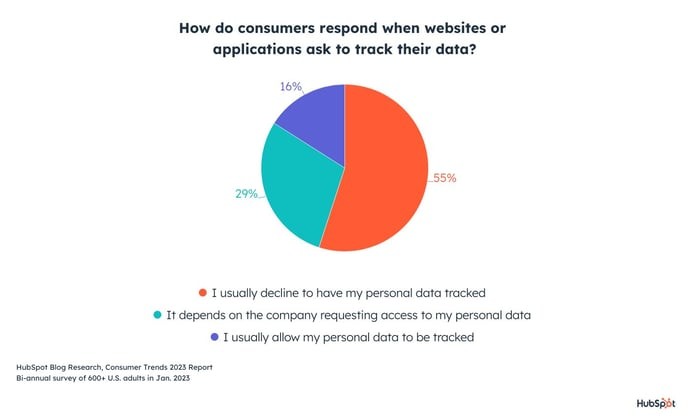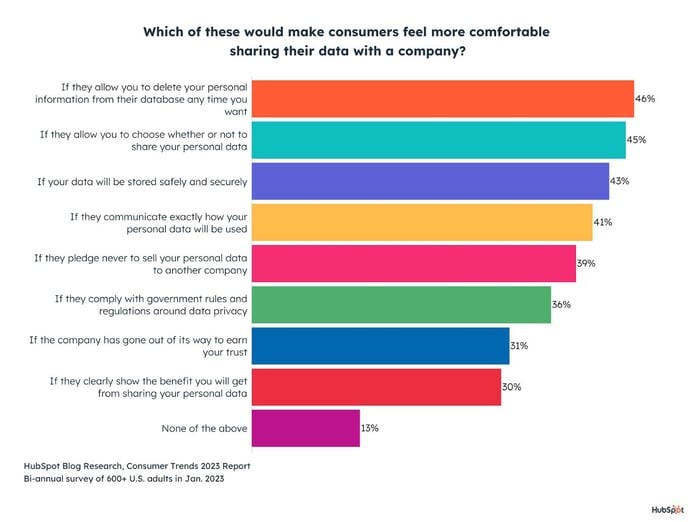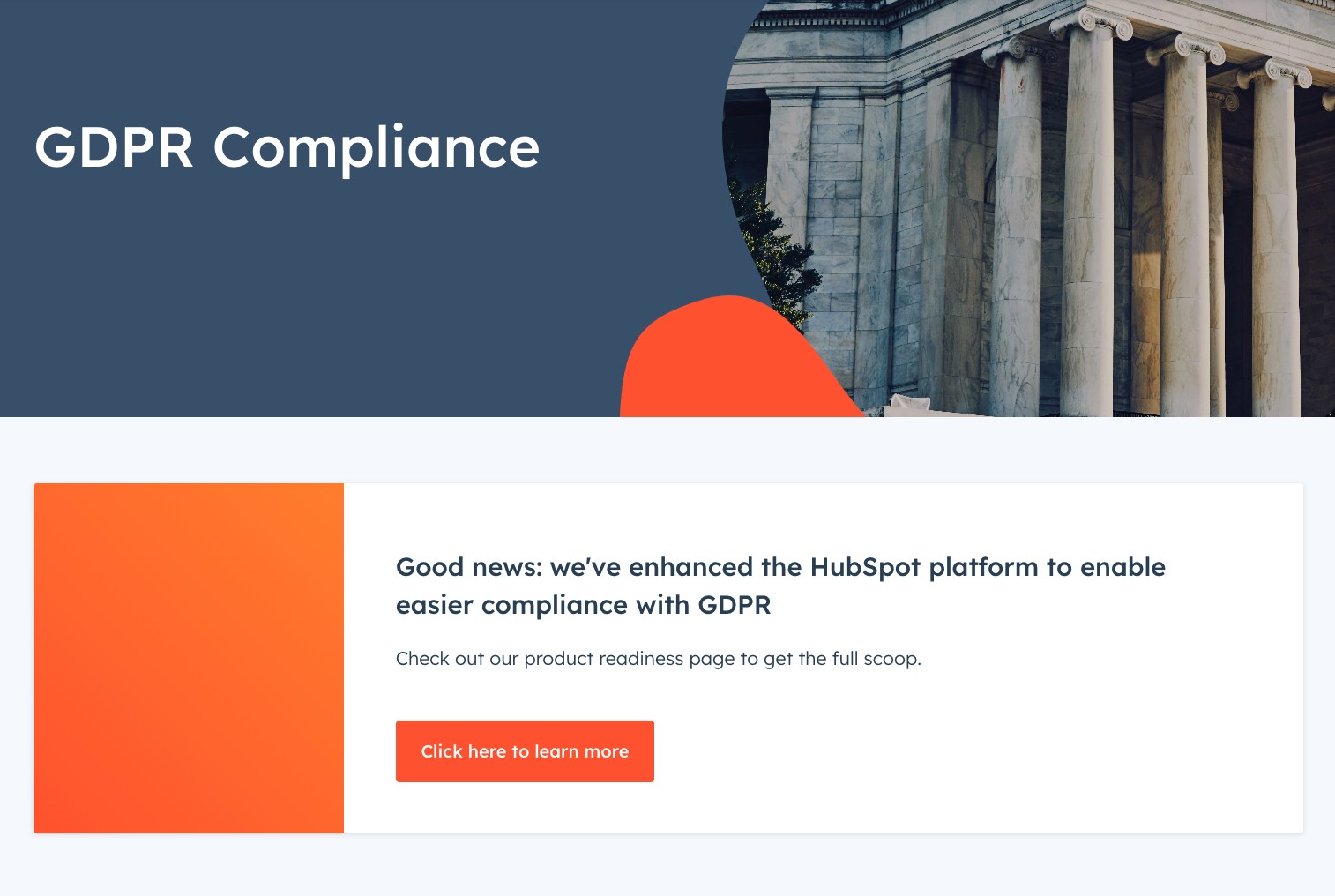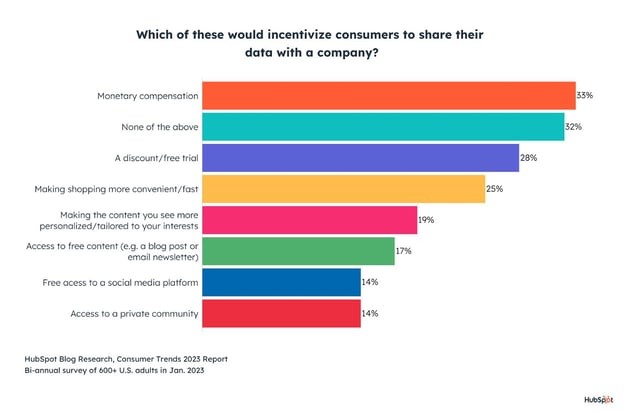In 2023, having the right data can make or break your brand. But, for good reason, consumer data is harder than ever to get.
As data privacy regulations continue to tighten and third-party data channels are phased out, just 29% of consumers say they trust brands with their data.
While businesses should want the data of prospects and customers to be protected, some of the excess analytics that companies once used to pinpoint behaviors and preferences of target audiences will become inaccessible as we enter a more privacy-first world.
Today, more than ever, it's up to brands to gain consumer trust, especially if they want to access the customer data needed to create effective and personalized experiences.
But – how do you do that when over half of consumers flat-out decline to share their data?
To help you build a data-gathering process that is effective, while also taking data safety and brand trust into account, we asked 600+ consumers what brands will need to do to make them feel more comfortable with sharing personal data.
How to Earn Trust When Gathering Data
Offering people control over their data, transparency into how it's being used, and keeping data secure are all key to encouraging consumers to share data. 
At the center of all of these considerations is building trust with consumers. Our survey found that 78% of people are more likely to share their data with a company they trust and 65% say trust is the determining factor in whether or not they choose to share personal information.
On top of that, 78% of consumers say they are more likely to buy from a company they trust with their data.
So let’s take a deeper dive into six steps you can take or consider in building trust with consumers (while still fulfilling your data needs). We’ll also look at the top incentives you can offer people for their data to create a mutually beneficial exchange.
1. Give Consumers the Power to Delete Their Data from Your Records
73% of consumers say they should have complete control over how companies use their data.
But right now, once they consent to sharing their data, consumers are mostly powerless to get it back. By letting consumers easily delete their personal data from your brand's database at any time, you allow them to maintain a sense of ownership.
Empowering consumers in this way also allows them to hold companies accountable. If people decide they no longer support a brand or are concerned about how their data is being used, they can get it back in a flash.
With 46% of consumers saying this level of control would make them more comfortable sharing data with a company, it could significantly boost trust between the two parties.
2. Give Consumers the Choice to Opt-in (and Out)
The second way to make consumers comfortable with sharing data also comes back to control. All you have to do is ask whether or not consumers want to share their data.
Not only does it build trust, but you’ll also improve your data quality by collecting data from people who actually want to give it to you.
3. Emphasize How Data is Securely Stored
Another major concern consumers have with sharing data revolves around how securely it is stored. Especially when it comes to making purchases with credit cards or sharing sensitive personal data, it's only natural to wonder what could go wrong if there was a breach.
Brands that can demonstrate their commitment to safeguarding consumer data will gain trust with their customers. By prioritizing data security, you create a trustworthy and safe environment that reassures consumers when it comes to sharing their personal information.
4. Clearly Explain How You Plan to Use Each Data Point
Another major concern consumers have is not knowing how their data is used. Without that knowledge, they can’t make an informed decision on whether or not to consent to it, so why would they?
41% of consumers say transparency on how their data is used will make them more likely to share it.
Especially if you're using that data to benefit the consumer by improving your product or making their experience on your website more personalized, you should communicate that when asking for data.
Struggling to explain why you need a specific data point? This could mean you might not need it and can eliminate one of the data-gathering tasks from your process, and more importantly, avoid worrying consumers by asking them for way too much unnecessary information.
5. Explicitly Pledge to Never Sell Consumers’ Personal Data
At HubSpot, we don't condone the selling of data and encourage you to build your own contact lists and data samples, especially when the data could be used by sales reps, email marketers or other entities that could make unwanted contact with your consumer.
Many consumers are very concerned about their data being resold to other companies. Suddenly they're being bombarded with ads, phone calls, and emails from people they don’t know selling products they don’t want.
If you are or aren’t selling consumer data, make that explicitly clear. They should ideally know exactly where their data is going and be able to decline giving it if it could be sold to companies they might not know.
Additionally, if you'll share data with ANYONE that isn't part of your immediate company, note which companies the data could be shared with or link to a deeper page or document that goes into deeper transparency about which companies the data will be used by.
6. Comply with Government Regulations (and Flaunt it)
Some countries have strict laws about collecting data from users, and 36% of consumers say it would make them feel more comfortable to know that brands are complying with these regulations.
While some states in the US have enacted data privacy laws, there isn’t a nationwide equivalent to the EU’s GDPR. If you're complying with data privacy laws in your country or state, make sure to flaunt it so consumers know their privacy is protected.
For example, HubSpot has an entire section of its site devoted to GDPR resources and information about how its tools should be used to create GDPR-compliant data-gathering and tracking strategies.

7. Offer Incentives for Sharing Data
Sharing data with a company can feel very one-sided. Making it a mutually beneficial exchange can help your data quality and build trust with your customers.
We asked consumers about what would incentivize them to share data. Here’s what we found:

Unsurprisingly, money is most preferred with 33% of consumers saying monetary compensation would encourage them to trade their data. This isn't that shocking as these consumers were paid a small sum of money to give their very thoughts for this post.
Other than money, 28% say discounts or free trials can sway them. Coupons, gift cards, and store credits can all be great ways to reward customers for giving you valuable information.
If you're a marketer who relies on data to better cater experiences to your loyal customers, you might be in luck with many of them. One in four consumers say they might be more likely to share their data for a more convenient shopping experience and 19% would be interested in sharing it for a more personalized experience.
You can also make trading personal data mutually beneficial by offering valuable content, like access to a blog or newsletter, in exchange for an email address. We discovered that 17% of consumers would be interested in that trade.
Despite all that, 32% of consumers refuse to be swayed, saying none of these would make them more likely to share data – though the tips we went over above could help address that.
The Future of Data Privacy
When it comes to the future of data privacy, all signs point to transparency, ownership, and trust.
With 74% of consumers in our survey saying that data privacy is a human right, creating a mutually beneficial exchange is key to gathering data from your audience and building an effective first-party data strategy.
Check out our 2023 Consumer Trends Report for more insights on topics ranging from data privacy to shopping habits, the impact of the recession, and the metaverse.
Disclaimer: This blog post is not legal advice for your company to use in complying with EU data privacy laws like the GDPR or state-by-state data privacy regulations. Instead, it provides background information to help you better understand the GDPR and existing regulations. This information is not the same as legal advice, where an attorney applies the law to your specific circumstances, so we insist that you consult an attorney if you’d like advice on your interpretation of this information or its accuracy.
In a nutshell, you may not rely on this as legal advice, or as a recommendation of any particular legal understanding.

